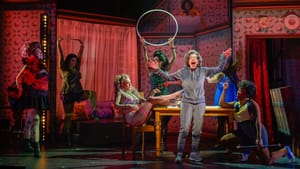Stay in the Loop
BSR publishes on a weekly schedule, with an email newsletter every Wednesday and Thursday morning. There’s no paywall, and subscribing is always free.
The body as a canvas
Philadelphia Theatre Company presents Erin Courtney and Max Vernon’s The Tattooed Lady

Philadelphia Theatre Company (PTC) is marketing its 2022–2023 season opener—the new world premiere musical The Tattooed Lady by Erin Courtney and Max Vernon—on the back of character actress Jackie Hoffman, whom you might recognize from Only Murders in the Building or The Marvelous Mrs. Maisel, or her Emmy-nominated turn in Feud: Betty and Joan. It’s a smart thing to do: a big name will frequently draw bigger crowds, and I confess that I myself was excited to see Hoffman perform. However, after attending an opening-weekend performance of The Tattooed Lady, I find myself feeling that the work is a success not because of Hoffman, but in spite of her.
Skin-deep stories
It’s not necessary to know the history of tattooed ladies in America to appreciate The Tattooed Lady, but it doesn’t hurt to at least be familiar with the existence of the popular sideshow performers frequently seen in the first half of the 20th century. PTC does provide some context here, thanks to dramaturgy by Sarah Lunnie, so that the audience member who visits PTC’s website or visits the mezzanine lobby display (created by co-manager of audience services Lauren Davenport) has at least a basic primer on the history of the tattooed lady.
But really, the important thing to know about tattooed ladies is that, unlike many other sideshow “freaks,” the tattooed ladies were not born with the features that made them an attraction but rather chose that life. And there was good money in it too—tattooed ladies could make 10 times what a dressmaker or farmer could have brought in at the time. To these women, becoming a tattooed lady was an act of liberation: they were choosing what to do with their bodies and making enough to support themselves without having to rely on a father or a husband.
It’s a dynamic premise for a play that Erin Courtney (book) and Max Vernon (book, music, lyrics, and orchestrations) deliver beautifully. The basic premise is that Ida Gibson, a former tattooed lady (Hoffman), now an octogenarian with a teenage granddaughter to raise and an art installation to protest, is visited by her former sideshow emcee (Anthony Lawton) and the ghosts of several of her tattooed lady forbears (Kim Blanck, Anastacia McCleskey, Sophia Ramos, Jessie Shelton, Grace Slear, and Katie Thompson). Eventually, Ida’s younger self (Ashley Pérez Flanagan) even shows up—not a spoiler if you paid attention to the show’s opening number—and the ghosts team up to try to get Ida to embrace her true self. Naturally, many musical numbers ensue.
A true ensemble piece
Hoffman may have been billed as the main attraction for The Tattooed Lady but Ida is far from the show’s lead character. For most of the musical, in fact, Ida is an observer while the other tattooed ladies tell their stories. Nora Hildebrandt (Thompson), La Belle Irene (Shelton), and Maud Wagner (Blanck), as well as young Ida herself, formerly known as Imagena Gibson (Pérez Flanagan), all tell Ida—and the audience—about themselves through showpiece musical numbers that led an audience member behind me to gush at one point: “I just can’t decide which is my favorite!” I tend to agree with them, although for me a true standout moment was during Maud’s scene when Blanck executed an impressive piece of marionette-like choreography (by Mayte Natalio), with the audience unable to see one of the ghosts (Slear) pulling her “strings” from above.
Slear, as well as McCleskey and Ramos, listed as Trixie Richardson, Lady Viola, and Jean Carroll, respectively, do quite a bit of heavy lifting in the show, too. We don’t really get much about their stories as tattooed ladies—too bad, because Carroll, especially, had a fascinating story—but instead they play all of the important figures in the other tattooed ladies’ lives. McCleskey, playing Imagena’s husband, is particularly memorable in this capacity.
The trouble with out-of-town talent
The tattooed ladies of the past are all embodied by strong-voiced performers, which made Hoffman’s performance so disappointing. Hoffman is an incredibly talented actor, and this was not her first foray into singing; however, she seemed to struggle with Ida’s singing part. Hoffman embodied Ida in spoken dialogue, but the singing vocals seemed to sit right over Hoffman’s “break” (the place where one’s voice moves between registers). While lyrics performed in her lower register sounded just fine, every time Hoffman’s voice went up, it was discomfiting.
PTC has a long history of bringing in big-name, out-of-town talent, presumably to get butts in seats, and this is not the first time I’ve seen a play dragged down, rather than bolstered, by its top-billed actor. I can think of at least a few Philadelphia-based performers who could have handled Ida’s songs better than Hoffman did, but unfortunately they would not have been the draw PTC seems to hope Hoffman will be. It’s to the detriment of the work.
The Tattooed Lady marks the first performance under the tenure of PTC’s new co-artistic directors Taibi Magar and Tyler Dobrowsky. The married couple is young and dynamic, and each comes to Philadelphia with impressive track records. One can only hope Magar and Dobrowsky will focus on cultivating and promoting more local talent to unburden PTC from its compulsion to bring in a “name.”
What, When, Where
The Tattooed Lady. Book by Erin Courtney and Max Vernon, developed with and directed by Ellie Heyman. $54–$74. Through November 20, 2022, at the Suzanne Roberts Theatre, 480 S. Broad Street. (215) 985-0420 or philadelphiatheatrecompany.org.
Accessibility
Masks are required at all Friday evening and Sunday matinee performances; they are optional, but recommended, otherwise. There will be reduced-capacity performances on Friday, November 11, and Friday, November 18.
The Suzanne Roberts Theatre is an ADA-compliant venue. Philadelphia Theatre Company will host an audio-described and open-captioned performance of The Tattooed Lady on Saturday, November 19, at 2pm, and an ASL-interpreted performance on Thursday, November 17, at 7pm.
Assistive listening devices are available at every performance.
Sign up for our newsletter
All of the week's new articles, all in one place. Sign up for the free weekly BSR newsletters, and don't miss a conversation.

 Jillian Ashley Blair Ivey
Jillian Ashley Blair Ivey